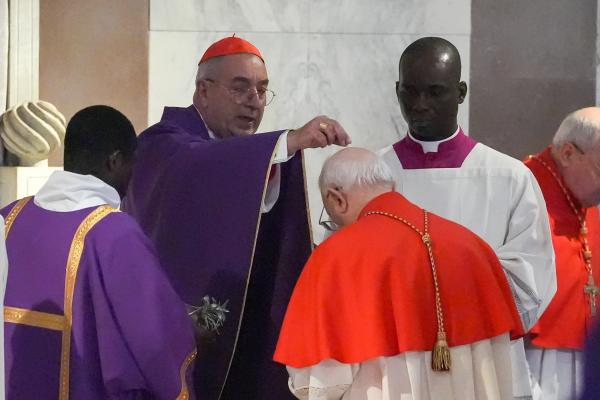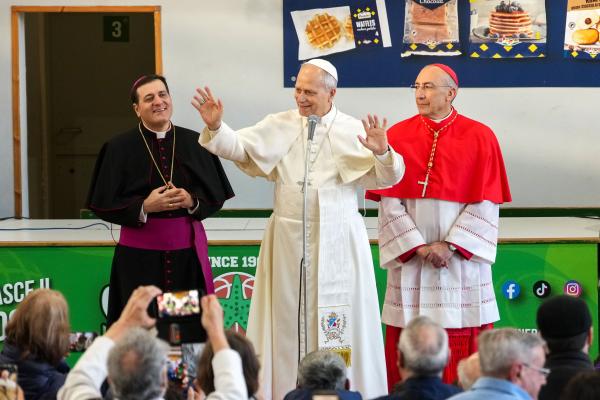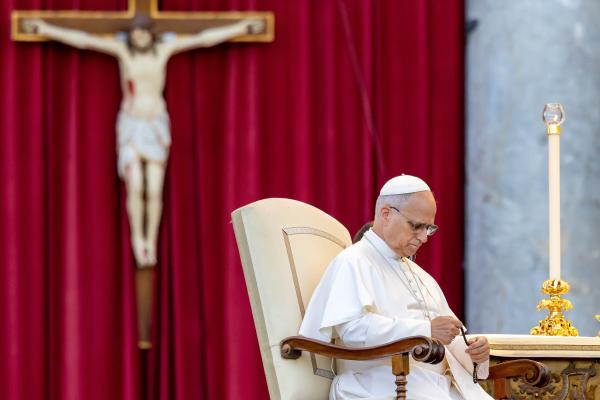Nuncio in Britain says pope won't overturn restrictions on old Latin Mass
The "news" about Pope Leo XIV and the pre-Vatican II Mass following the plenary assembly of the Catholic Bishops' Conference of England and Wales is not so new after all.
 Cindy Wooden
Cindy Wooden

U.S. Cardinal Raymond L. Burke elevates the Eucharist during the consecration while celebrating a traditional Latin Mass at the Altar of the Chair in St. Peter’s Basilica Oct. 25, 2025, with the permission of Pope Leo XIV. (CNS photo/Lola Gomez)
VATICAN CITY (CNS) -- Pope Leo XIV does not intend to overturn Pope Francis' limits on celebrating the traditional Latin Mass but will grant two-year dispensations to bishops who ask, a nuncio said.
Archbishop Miguel Maury Buendía, the apostolic nuncio to Great Britain, told bishops Nov. 13 that Pope Leo told him he would not abrogate "Traditionis Custodes," Pope Francis' 2021 letter greatly restricting the celebration of Masses according to the 1962 Roman Missal, the Latin liturgy in use before the reforms of the Second Vatican Council.
The Vatican press office did not respond to a request for comment.
But the archbishop made headlines by telling members of the Catholic Bishops' Conference of England and Wales that the pope would grant bishops who request it a two-year, renewable exemption.
The exemptions are nothing new, a Vatican official told Catholic News Service Nov. 14.
"This is no more than a restatement of the practice of the Dicastery for Divine Worship and the Discipline of the Sacraments since the motu proprio ('Traditionis Custodes') came into force," said Msgr. Enda Murphy, an official at the dicastery.
"What the nuncio is clearly referring to is the necessity for a diocesan bishop to request a derogation from art. 3 § 2 of 'Traditionis Custodes' in order that Mass according to the Missale Romanum of 1962 can be celebrated in a parish church," he said.
The subsection referred to by Msgr. Murphy says that a bishop can designate one or more locations where the faithful who had been celebrating the older Mass could continue to do so, "not however in the parochial churches and without the erection of new personal parishes."
In late October, various Catholic news outlets reported that the Diocese of Cleveland, led by Bishop Edward C. Malesic, had received permission for the older Latin Mass to continue at two parish churches in his diocese. In July, Bishop Michael Sis of San Angelo, Texas, confirmed that he had made a similar request, which was granted.
Pope Leo also personally granted permission for U.S. Cardinal Raymond L. Burke, a former Vatican official, to celebrate the older form of the Mass in St. Peter's Basilica in late October.
When Pope Francis issued the restrictions, he declared the liturgical books promulgated after the Second Vatican Council to be "the unique expression of the 'lex orandi' (law of worship) of the Roman Rite," restored the obligation of priests to have their bishops' permission to celebrate according to the "extraordinary" or pre-Vatican II Mass and ordered bishops not to establish any new groups or parishes in their dioceses devoted to the old liturgy.
At the time, Pope Francis said his decision was meant "to promote the concord and unity of the church."



